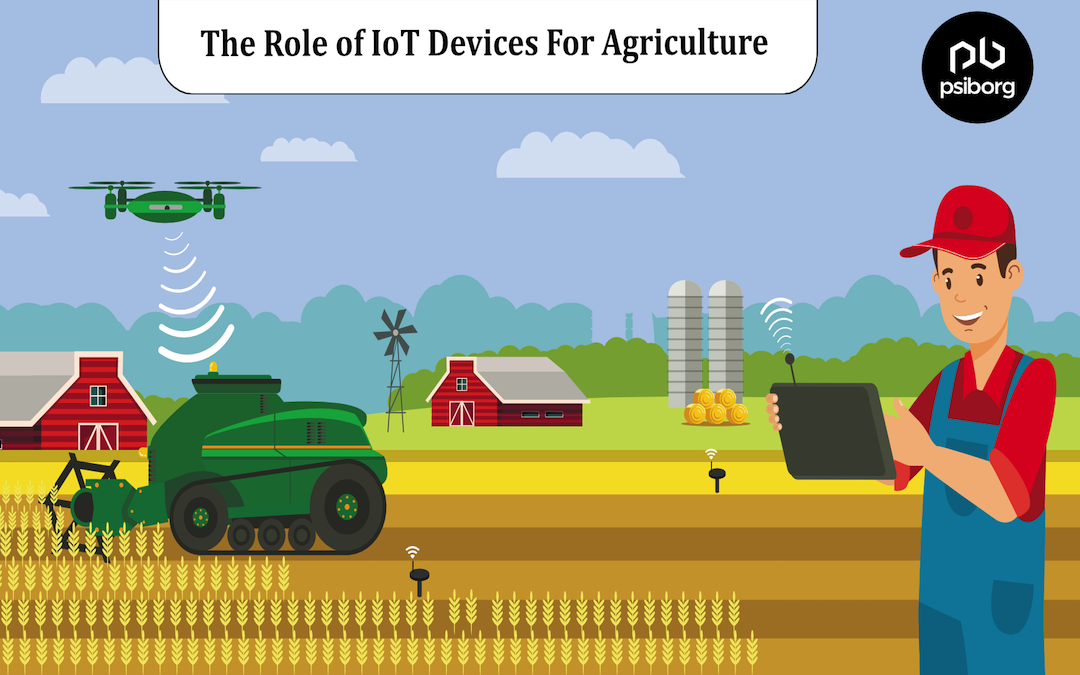
IoT devices for agriculture practices are the new talk of the town. The use of IoT devices in agriculture is termed smart agriculture or smart farming. Integration of IoT in agriculture practices involves the use of sensors, actuators, wireless communication, and networks to monitor and automate agricultural operations.
IoT has this unique ability to connect everything for communicating and interacting with them. This feature of IoT helps farmers monitor soil and crop health, crop yield and automates irrigation.
In this article, we will discuss how IoT devices are helpful in agriculture, their role in farming, their benefits, and their future scope.
Why Do You Need Smart Agriculture Over Traditional Farming?
The ultimate goal of utilizing smart agriculture practices is to increase the quality and quantity of the crops by also minimizing the number of laborers on the field and reducing the money spent on production.
Traditional Agriculture vs. Smart Agriculture
| Traditional Agriculture | Smart Agriculture |
|---|---|
| Often leads to overuse or underuse of resources due to lack of precision. | Uses IoT and sensors to precisely allocate water, fertilizers, and pesticides, reducing wastage. |
| Relies on conventional methods with variable outcomes, like lower crop yield. | Data-driven decisions and precision farming techniques enhance crop productivity. |
| Inefficient resource use and manual labor work increase overall farming costs. | Automation and targeted resource use lower operational expenses and input costs. |
| Improper practices and lack of monitoring often degrade soil quality. | Continuous monitoring and precise nutrient management maintain and improve. |
| Traditional methods always lead to excessive water use and wastage. | Smart Irrigation System Using IoT optimize water use, conserving water resources. |
| Reactive responses to climate events often lead to losses. | Predictive analytics and advanced monitoring help farmers anticipate and adapt to climate change. |
IoT Devices for Agriculture: What They Offer?
Now let us explore how IoT is transforming agriculture:
1. Precision Agriculture: Data-Driven Decisions for Higher Yields
One of the most significant contributions of IoT is enabling precision agriculture. Traditionally, farmers relied on intuition and experience to manage crops. Now, IoT devices like sensors collect real-time data on various aspects like:
- Soil moisture: Sensors measure soil moisture levels, allowing for irrigation based on actual needs, preventing water waste, and ensuring optimal crop growth.
- Temperature and humidity: Environmental sensors monitor temperature and humidity, which is crucial for regulating greenhouse conditions or triggering alerts for frost risks.
- Nutrient levels: Sensors analyze soil nutrient content, enabling targeted fertilizer application, and reducing costs and environmental impact.
This data empowers farmers to make informed decisions. They can optimize irrigation with a smart irrigation system, saving plenty of water. This will also help farmers to apply fertilizers only in the required quantities, minimizing waste and environmental pollution.
More importantly, farmers can identify potential problems like pest infestations or diseases early on by monitoring various parameters, allowing for timely interventions and minimizing crop losses.
2. Remote Monitoring: Staying Connected from Anywhere
Gone are the days when farmers had to be physically present in their fields all the time. IoT devices enable remote monitoring of farms:
Equipped with sensors and apps, these smart IoT devices allow farmers to access real-time data on their crops, livestock, and farm equipment from any location with an internet connection.
This remote access empowers farmers to make timely decisions, optimize resource allocation, and also improves work-life balance by allowing farmers to manage their farms efficiently while attending to other responsibilities.
3. Automation and Efficiency: Streamlining Farm Operations
IoT also aids in automating various farm operations, like automating irrigation using smart irrigation systems. These systems use sensors and actuators to manage irrigation schedules based on real-time data, ensuring optimal water usage and reducing human intervention.
Then there are smart greenhouses where sensors and actuators can regulate temperature, humidity, and ventilation within greenhouses, creating ideal conditions for plant growth and minimizing manual labor.
In addition to farming, IoT devices are also utilized in livestock management practices. There are cattle health monitoring system that come with smart collars and pedometers to track and monitor cattle’s health and location in real-time.
Automation through IoT devices leads to several benefits, such as increasing efficiency by saving time and reducing operational costs.
4. Improved Market Access and Farmer Income
IoT also connects farmers directly to markets. Farmers can access real-time market data on commodity prices, enabling them to make informed decisions about selling their produce at opportune moments.
Moreover, online marketplaces connected to IoT systems can facilitate direct sales from farm to consumer, eliminating middlemen and increasing farmer income.
This improved market access benefits farmers by giving them bargaining power, improving their income opportunities, and empowering their overall livelihood.
Summary
The IoT devices for agriculture gather real-time information on soil, such as pH level, and humidity. Moisture level, and nutrition level and sends the data to the cloud server. The data is analyzed and processed on the cloud to give accurate information to the farmers through mobile/web apps.
The use of IoT devices in agriculture practice will certainly reduce manual and traditional efforts by 90%.
Share this post
Leave a comment
All comments are moderated. Spammy and bot submitted comments are deleted. Please submit the comments that are helpful to others, and we'll approve your comments. A comment that includes outbound link will only be approved if the content is relevant to the topic, and has some value to our readers.


Comments (0)
No comment